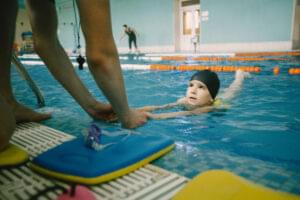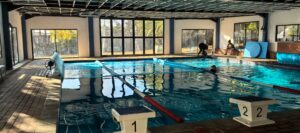
When winter rolls around, many parents consider hitting pause on swim lessons until warmer weather returns. But this break can actually cause swimmers to regress in ability—and ultimately cost more in lessons to catch up. Learning to swim isn’t just a seasonal activity; it’s a vital, lifelong skill best maintained year‑round.
- Prevent Regression and Save Money
Swimmers, particularly young ones, can lose the progress they made over summer quite fast—sometimes in just a few weeks. One swim teacher warns that “it takes just two weeks to lose skills” and winter breaks often lead to lower confidence when spring arrives. A blog from Little Fins Swim School reinforces that “preventing seasonal regression… helps retain skills and saves money in the long run”. - Heated Pools Keep You Comfortable and Consistent
Indoors and heated, winter pools are warm and inviting—even on the coldest days. Many programs heat their pools to around 30–32 °C, making lessons cozy and effective year‑round. Staying consistent means swimmers build confidence steadily, avoiding the awkward step-back that often comes with a long break. - Boost Immunity and Physical Fitness
Contrary to old wives’ tales, swimming in winter can help strengthen immunity, not weaken it. Regular sessions in heated pools improve circulation, lung function, and fitness—and many facilities report fewer colds in winter swimmers. A study from La Trobe University highlights that year‑round swimming helps build resilience and supports overall health. - Strengthen Mental Well‑Being
The shorter, darker days of winter can dampen moods—especially for children. But swimming releases endorphins, improves mood, and provides structure through an indoor, consistent routine. Studies of winter swimmers also show improved mental clarity, stress relief, and better energy levels. - Water Safety Doesn’t Happen Only in Summer
Drowning risks persist year‑round, whether in indoor pools, bathtubs, creeks, or filled troughs. Continuing lessons in winter ensures that essential skills—floating, treading, safe exits—stay sharp for unexpected situations. - Saves Time and Avoids Frustration Later
If lessons pause in winter, skills often need reteaching in spring. Learning to swim involves muscle memory, coordination, and cognitive connections that rely on repetition. Outdoor hiatuses require time-consuming catch-up later. - Creates a Fun, Indoor Winter Activity
Swimming in a warm indoor space provides a great family activity during cold, rainy days. Lessons foster social connections, help burn off energy, and add variety to winter routines—far better than staying idle or glued to screens.
In Summary
Benefit: Skill retention | Details: Avoids regression, protects progress, and saves on future lessons
Benefit: Comfort & consistency | Details: Heated pools mean steady, enjoyable lessons
Benefit: Health benefits | Details: Improved immunity, fitness, and wellness
Benefit: Mental resilience | Details: Endorphin release, routine, and social interaction
Benefit: Safety | Details: Keeps essential life-saving abilities sharp year-round
Ultimately, learning to swim during winter—especially in a heated indoor pool—protects the investment you’ve already made. It sustains progress, promotes health, avoids future catch‑up costs, and ensures readiness for any water-related scenario come summer—or anytime life throws one your way.




